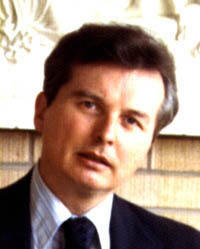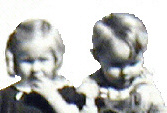
Everyone should be so lucky to have a real live mentor. I was finishing my four-year study program (in a two-year mad dash) at the University of Colorado. I needed to do one semester of student teaching somewhere, anywhere, in order to graduate and acquire a teaching license. Mentors, like angels (so they say), can appear in unexpected ways. Mine arrived one afternoon in 1959 as I was looking anxiously for test results posted on the door of my Russian professor, Tatania Nennsberg. Libor Brom, a naturalized citizen and refugee from Communist Czechoslovakia three years earlier, looked over my shoulder and asked with a twinkle in his ever-mischievous eyes, "Aha! So you're being tortured by Tatania, are you?" Libor, as it turned out, was a graduate student and occasionally taught Russian at the university. What followed was a friendship that never became "palsie-walsie" (because Libor was the consummate professional), but rather was warm and respectful--above all, always inspiring. Libor was also teaching Russian at a Denver area high school, so he arranged for my student teaching under his tutelage. He also got me my first teaching job in the then-prestigious Jefferson County School system.
Libor taught me lots of things, but I've picked out three I consider worth relating here: (1) How to deal with self-important bureaucrats and bureaucracies at various levels, and (2) The vital importance of knowing how rare and precious American freedoms are, especially those we enjoy and take for granted in the U.S.A. (3) The importance of acquiring a permanent sense of humor and being able to use it either as a defensive weapon against oppressors, or as a crutch for those inevitable depressing moments that make up life.
(1) Bureaucrats and bureaucracies: The best way to condense this lesson is to relate how Libor, at the time I met him, was on legal eggshells or, stated differently, on his best behavior--he was waiting for his permanent residency from Immigration and Naturalization.* At the same time, he was committed to lead his high school Russian students on a summer tour of Europe in 1960. His residency terms specified that he could not leave the U.S.A. without permission and then only for approved emergency reasons, for a short period. Libor tried to negotiate an exception, but he was rebuffed.
*Before Libor fled his native land, he had been a practicing lawyer and was a high level, upcoming star in the central administration that directed the economics of Czechoslovakia, interpreting and applying the regulations that flowed from the country's Soviet masters. His wife was a diva "name" stage and film actress. But Libor could not convince his wife and small baby to flee with him, so he landed in Canada alone, eventually ending up in the U.S.A. Undoubtedly, Libor's sensitive position in the communist government of Czechoslovakia had much to do with the delicate way U.S. immigration authorities were handling his request for U.S. residency.
He seemed completely unfazed about this dilemma. He continued to make plans to lead his students on a triumphant tour of Europe. "But Libor, what about your travel restrictions. You don't have a passport. You can't get over the borders without one. Worse than that--you won't be able to get back into the U.S. You ought to be finding a substitute," I counseled gratuitously. "Not to worry, " he winked. "Here, I'll show you." From his briefcase he pulled out a legal-sized sheet of plain paper, on which he had typed his "vital statistics" above a very official sounding couple of lines that named him an "officially designated foreign relations appointee, employed by the University of Colorado, Boulder, to conduct academic research abroad in pursuit of . . . . "
Below this, he had listed each of his students' names, addresses, and the signatures of their parents--all very official looking: Neat, precise, and very official looking. Next to this he applied a red wax seal under his signature--rendered in his flamboyant, European-style, lawyer style. "I'll be concerned only at the first border we have to cross. But once I have the stamps, visas, and initials of the border customs officials, I'll have no problems from that point on. And if I am stopped by U.S. customs upon return, I know they'll be impressed (and not wanting to display their bewilderment) at my document full of customs stamps and entry visas--there's no official with courage enough to challenge the decisions of the officials in 10 European countries."
I worried about Libor for the next two months that summer. But one day in early September, on schedule, he was back and hadn't been in jail along the way! Over coffee at the student union, he pulled out that audacious document, now covered with dozens of foreign entry and exit visas--looking like a modern day Magna Carta. "It's a trick and attitude I learned from my days under Hitler and Stalin, but I'm sharing this with you, because you must learn to know the nature of bureaucracies."
I've had several occasions to apply Libor's principles over the years and today they underlie my "attitude" when bureaucrats seem to unreasonably rely on power and domination. It's an attitude I find I'm applying with increasing frequency these days--especially living on the border with Mexico. It has to do with these tense days of Homeland Security and the Patriot Act--it has to do with fear, in other words. The very thing Libor came to know and finally fled in 1956. A few of my critics have called my handling of pushy Federal Border agents audacious ("why challenge them--you'll get yourself on a list" they counsel)--but it all goes back to Libor Brom's influence.
(2) The importance of recognizing our rare and vital freedoms: This is rather directly connected with Item #1 above. Libor's experiences under the Nazi and Communist heels were filled with fear, foreboding, and terror--experiences few native-born citizens have ever known. Our sessions were rarely just to "hang out" in today's vernacular. We were both too busy for that luxury; in addition, Libor had also acquired a sense of urgency about life, wanting to relish each moment in his newly adopted country. So when we did get together, it was to carry out "serious" matters, such as our discussions about his PhD research, about academic areas in which I was having difficulties. During these sessions, Libor was master at evoking my sense of shame that I didn't know enough detail, both historical and content, about the U.S. Constitution. I learned all about "socialism" which Libor fiercely opposed. "It's not natural, Grant. Its proponents pander to the people, but it's for one thing only: to acquire raw personal and institutional power. Believe me! I was once an official in a communist regime charged with acquiring power, by means of pseudo-legal means, for my bosses and indirectly for myself." That's when Libor was overcome with the immorality of his lifestyle and decided to flee.
(3) Having a sense of humor: "Bureaucrats in general, but especially authoritarians, are a humorless lot, " Libor taught me. "Have you ever seen editorial humor in their media? Of course, not, because their editorial commentary deals with praise for the regime--not their excesses; in effect, humor is outlawed in authoritarian regimes. The only humor, if you can call it that, is when a dictatorship expresses ridicule and humiliation for its enemies--anyone suspected of opposition. Whenever you encounter a humorless bureaucrat, watch out," Libor counseled. "They've come to think of themselves as very important--beyond criticism or humor." Having been forbidden to laugh for most of his life, now Libor found great satisfaction in learning and telling jokes--especially ones that poked fun at bureaucrats and self-important academicians. He could always be counted on to be the gadfly at the few social events we attended with him, especially if politicians, puffed-up professors, or pretentious PhD candidates were around.

No comments:
Post a Comment